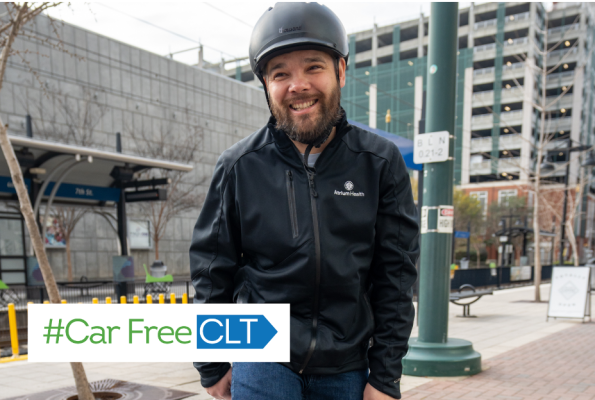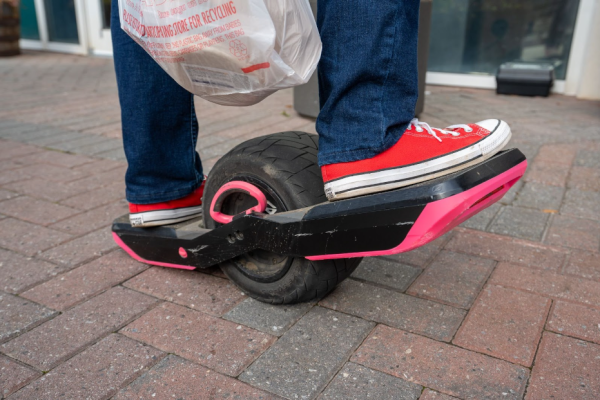Rikki’s story: When Onewheel is better than four

Ricky Bower
At Sustain Charlotte, we’re all about promoting sustainable transportation options. So, when we saw Rikki Bower gliding by on his electric Onewheel in Uptown one morning, we had to ask him, what is your #CarFreeCLT story?
Thankfully, Rikki graciously offered his time and insight, and his inspiring journey is now available for you to read below.
A few years ago, Rikki moved to Charlotte from San Diego, a relatively walkable community where the trolley took him most places he needed to go.
After moving to Charlotte’s Oakhurst area, though, he found that having a car felt more like a necessity. At the time, waiting for the bus in southeast Charlotte could take upwards of 20-30 minutes, only to wait again for a transfer at the Charlotte Transportation Center. A single trip from his neighborhood up to the University area could take well over an hour.
“I was thinking to myself, why do I have to go all the way to Uptown just to go north?”
Rikki relied on a car for a while, until a trip to London reinspired his interest in public transit. He returned from the trip, immediately sold his car, and invested in a Onewheel, a small electric-powered wheel with a platform on each side.

A Onewheel is an electric single-wheel board with travel speeds of up to 13 m.p.h.
At first, the transition to life without a car felt daunting. Without a car, Rikki’s commute times lengthened, he was occasionally caught in the rain, and he found it harder to say yes to invitations to social events, which required careful planning. After a while, Rikki realized if he was going to make this new lifestyle work, he had to live somewhere that was more conducive to life on foot.
Rikki found his answer at The Joinery, an apartment complex in South End that promotes sustainable living with its car-free design, ample bike racks, and accessibility to the Light Rail and Uptown. Although his rent increased with the move, he found comfort in not having to make a car payment.
Living in a more walkable area has helped shape new lifestyle habits for Rikki, who now walks about 25,000 steps a day. Hesays walking has contributed to weight loss and an increased sense of mindfulness and appreciation for the environment.
“It’s interesting how your brain changes. When you have a car, you’re probably thinking about the quickest way to get somewhere, right?”
Now, a walk presents an opportunity for Rikki to observe nature or read a book while riding public transit. Not having to be on the road also means Rikki never has to think about parking or arriving somewhere early to seek out a parking spot.
Since making the transition, Rikki has learned a few things about getting around on one wheel versus four.
“For me, I think about the safest way to get somewhere. For instance, if I have a meeting in Uptown and I have to be there at 11, then I’ll pay attention to weather conditions and go from there. Whereas, when I had a car, I didn’t even think about it, I just left fifteen minutes early.”
Another learning lesson? Managing your stuff. Life on one wheel doesn’t lend itself to storage.
“I’ll dress in layers more so I can stay warm or take something off if I need to,” Rikki says, who goes everywhere with a backpack. “I have all the things that I might need, like a water bottle, an extra charger for my phone, and a tote bag in case I go to the grocery store.”
Having a good charge on his phone has been essential. Rikki’s phone serves as his GPS and bus pass. And in the event that he is out past midnight and the Blue Line has stopped running, there is some comfort in knowing that while he generally avoids it, he could call an Uber or Lyft.
Are you considering going car-free in Charlotte?
Rikki’s advice is to start small and make conscious choices, such as taking a walk to the grocery store instead of driving. He also emphasizes the need to prepare your family and friends for the transition, because it may take a while for them to “get it” and not see this choice as an oddity.
If you do face some raised eyebrows and stares, he says it’s important to remember that while our country is heavily car-centric, most of the world sees having a car as a luxury, not a necessity.
By gradually incorporating walking, biking, or using public transit into daily routines, it may start to feel more natural to envision what it would be like to live a car-free lifestyle.
“When I first started this journey, I would say I was ‘car-less,’” Rikki says.
”My dad asked me to stop saying it like that, because it sounded like I lost my car. He was the one who said I should start saying ‘car-free’ and I think that makes sense, because it’s more my choice.”
In July, it will be three years since Rikki made the decision to downsize from four wheels to one. On the anniversary of each year since he sold his car, he asks himself, “Is this still working for me? Do I enjoy it? And what are the honest barriers that I have to deal with?”
“At the end of the day, I think I’m happier, not having a car,” Rikki says. “And I think if more people try it, then we would have a more sustainable Charlotte.”
About #CarFreeCLT
Andy Patel started attending events hosted by Sustain Charlotte back in 2019 and has volunteered throughout the years, most recently attending an ambassador training. He appreciates that Sustain Charlotte shares his enthusiasm for sustainability and can help bring about change at a large scale.
Do you have a story to share about how you get around the greater Charlotte area without driving? Post your story to social media with the hashtag #CarFreeCLT and tag us! Your story will help us raise awareness of the challenges people face navigating our region without a car, and may also serve to inspire those who heavily rely on a car to consider more sustainable options! Thank you.
Thanks for reading!
As a nonprofit, community support is essential for us to keep doing what we do — including providing free articles like this. If you found this article helpful, please consider supporting Sustain Charlotte.
Want to stay in the loop? Subscribe to our weekly newsletter and follow us on Instagram, Facebook, and X.
